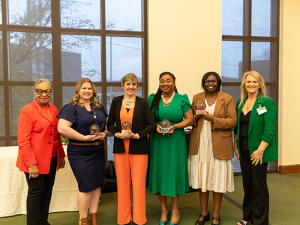 With more than 10 years of experience studying plant-microbe interactions using genetic and biochemical approaches, Karolina Mukhtar, Ph.D., associate professor and associate chair in the Department of Biology, has been published in journals such as Frontiers in Plant Science and Journal of Visualized Experience. But it isn’t just her broad training as a molecular plant biologist that makes her an outstanding educator, students and colleagues say — it’s her ability to make the subject material interesting and exciting. These descriptors and more earned her a President’s Award for Excellence in Teaching this year.
With more than 10 years of experience studying plant-microbe interactions using genetic and biochemical approaches, Karolina Mukhtar, Ph.D., associate professor and associate chair in the Department of Biology, has been published in journals such as Frontiers in Plant Science and Journal of Visualized Experience. But it isn’t just her broad training as a molecular plant biologist that makes her an outstanding educator, students and colleagues say — it’s her ability to make the subject material interesting and exciting. These descriptors and more earned her a President’s Award for Excellence in Teaching this year.
“She engages students in such a way that we feel we can truly impact the world — we aren’t just idly sitting in desks learning information for future tests,” wrote a student. “She challenges us to take what we have learned and utilize it outside of the classroom, ever reaching to improve not only our own lives, but the lives of others.”
Mukhtar’s courses are a “stimulating blend” of PowerPoints, articles from both scientific and popular press, virtual simulations, Canvas-based quizzes and animations, writes a colleague – and Mukhtar was the first biology instructor to implement the iClicker classroom response system, working with other faculty to train them in the technology. She also spearheaded the mobile phone-distraction-reducing app Flipd in her classroom.
“She is abreast of the newest classroom technology available and is not afraid of trying out new tools to improve her courses,” a colleague wrote.
In courses on genetics and plant biology, Mukhtar is constantly searching for ways to better her explanations and teaching methods to “ensure her students gained a deeper understanding,” wrote a student. She is also admired for handing discussion of controversial topics, such as genetically modified organisms (GMOs) professionally — in one course, she organized a debate, asking students to consider arguing against their previously held opinion in order to better understand the opposing viewpoint. While a student present remembers “passionate arguments on both sides,” they also remember Mukhtar’s ability to keep the debate in check.
“Dr. Mukhtar’s method of leadership kept the environment friendly so that it became an atmosphere of opportunity,” the student wrote. “We learned not only the importance of deciphering scientific, provable information, but also were reminded of the significance of respect.”
Mukhtar’s teaching and scholarly activities make her a “strong role model for both undergraduate and graduate students,” writes one nominator, who references Mukhtar’s active and externally funded research lab. More than 50% of the students who have trained in her lab are currently pursuing health or biomedical postgraduate training opportunities. Mukhtar is also known to keep an open-door policy, where students can ask questions about courses or ask for advice.
“Dr. Mukhtar is a gifted teacher, adviser and mentor,” a student wrote. “Accessible to students in and out of the classroom setting, Dr. Mukhtar’s welcoming demeanor serves to encourage students to share their professional goals and life dreams.”



















